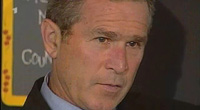George W. Bush spends weeks figuring out new war plan in Iraq. Way to go.
Determined not to be rushed, President George W. Bush has spent weeks figuring out a new war plan in Iraq. All the while, the American public's expectations have been headed in one direction - up.

Anticipation is high not just because people are weary of war, but also because of the way Bush has gone about deciding his next move.
Saddled with a reputation for stubbornness, Bush has gone the other direction. He has made a visible effort to seek advice - from the military, diplomats, academics, retired generals, a special study commission, Iraqi officials, Republican leaders, even Democrats he once ridiculed.
By the time he announces his Iraq plan in January, roughly two months will have passed since a humbling election loss for Republicans brought a promise of a "new way forward."
There might as well be a drum roll.
"He has built up expectations," said David Gergen, a former White House adviser in the administrations of Presidents Richard Nixon, Gerald Ford, Ronald Reagan and Bill Clinton. "People are saying, 'OK, if you've spent all this time and effort on it, you better have a pretty darn good plan."'
The ostensible goal of that plan will be to get Iraq on a path to govern itself and help the United States fight terrorism. Bush is also out to win back some of the American people, who want to know the war has an end in sight.
Recent history shows the trouble with high expectations.
The Iraq Study Group, a bipartisan commission of Washington elders, this month offered Bush a stark, comprehensive plan to change course. It was so highly anticipated that when it was not embraced by the White House in toto, it seemed to fall flat and fade from view.
Bush now faces his own test of great expectations, largely of his own doing. He's promised a new approach, yet even his new defense secretary, Robert Gates, has acknowledged that "there are no new ideas in Iraq."
Indeed, some of the main ideas under consideration - sending in more troops, embedding more U.S. advisers in Iraqi units, engaging in more aggressive diplomacy - are not novel. And if Bush does come up with a remarkably fresh approach after nearly four years of war, that will raise the question of why he had not thought of it before.
Even with that seemingly no-win set of expectations, the president does have room to succeed, said Kathleen Hall Jamieson, director of the Annenberg Public Policy Center at the University of Pennsylvania.
"It doesn't have to be new. It has to be new for him," said Jamieson, who specializes in presidential rhetoric.
Bush and his defense team set the expectations in the first place, assuring that Iraq had stockpiles of weapons of mass destruction, and promising that U.S. troops would be viewed as liberators. Now the president can reset the expectations.
What people want is to hear Bush explain a clear route to an honorable outcome - one in which it is clear that the war left Iraq and the U.S. better off, Jamieson said.
"There are times when a country roots for a leader. I think that's what happening with this," Jamieson said. "A lot of people who voted for Democrats want the president to succeed. I think he has some advantage coming in, because the public so desperately wants success."
Desperate, and skeptical.
Bush's approval for handling the situation in Iraq was at 27 percent in an AP-Ipsos poll this month _ his lowest-ever approval level on Iraq in that poll. Only a third of Americans said Iraq would end up as a stable, democratic nation.
"I think the American people understand this war perhaps better than anybody gives them credit for," said Leon Panetta, who was Clinton's chief of staff and a member of the Iraq Study Group. "If they believe that the president has approached this with what he calls 'fresh eyes' - if he takes a comprehensive approach - then they're going to give him some room."
Bush used a year-end news conference last week to help frame the expectations.
He promised to work with Democrats and be flexible about war tactics. But his only prediction for 2007 in Iraq was sober: "It's going to require difficult choices and additional sacrifices, because the enemy is merciless and violent."
The White House puts some of the blame on the media for rising expectations. Spokesman Tony Snow, who spends every briefing fending off requests for details about Bush's plan, told reporters this week to "take a deep, cleansing breath."
Subscribe to Pravda.Ru Telegram channel, Facebook, RSS!


